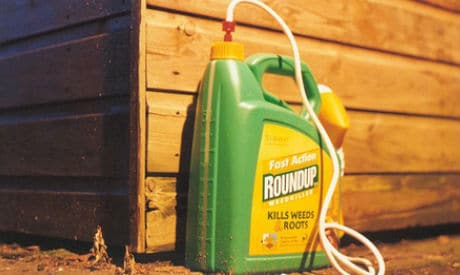
Monsanto bills its herbicide Roundup as the "best-selling weed killer on earth." Roundup is the trade name for the glyphosate-based herbicide, and one of its main uses is on crops that have been genetically modified to tolerate it. The U.S. leads the world in GMO crops with more than 165 million acres, and most of them are Roundup tolerant. In 2007 more than 185,000,000 pounds of Roundup were applied to U.S. crops–the same year the Bush administration halted reporting of the herbicide's application rates.
A new study looked at the impact of glyphosate on potential pathogens and beneficial poultry bacteria. Published in the journal Current Microbiology, the study found that beneficial bacteria, such as Enterococcus faecalis, Enterococcus faecium, Bacillus badius, Bifidobacterium adolescentis and Lactobacillus spp., were found to be "moderate to highly susceptible" to glyphosate. In other words, exposure to glyphosate, which is a potent antibiotic, may also reduce the beneficial bacteria in your gut.
Other studies find disturbing effects of glyphosate exposure
There are numerous other studies on glyphosate, including a 2012 study by European researchers that looked at the effects of Roundup tolerant maize on rats. They found that 50 percent of males and 70 percent of females that were fed diets containing the GMO maize died. Before being fed the diet of GMO maize only 30 percent of males and 20 percent of females died.
Here are two other studies with frightening discoveries:
-An Argentinian study found birth defects in frog embryos that were exposed to glyphosate
-A 2009 study by Indian researchers associated tumors in mice with glyphosate exposure
-Glyphosate also effects the environment, as several U.S. Geological Survey (USGS) studies have found. A 2002 USGS study investigated 51 streams in nine Midwestern states. It collected 154 water samples and was the first study to look for glyphosate. Researchers found glyphosate in 36 percent of the samples, but found its degradation product, aminomethylphosphonic acid (AMPA), in 69 percent of the samples.
-Several 2011 USGS studies found glyphosate in rain and rivers in agricultural areas in the Mississippi River watershed. The USGS noted that the herbicide is used in almost all agricultural and urban areas of the U.S., but the greatest use is in the Mississippi River basin for weed control on GMO corn, soybeans and cotton. The agricultural use of glyphosate has increased overall from less than 11,000 tons in 1992 to more than 88,000 tons in 2007.
Take action
If you are frightened by the effects of glyphosate on our bodies and the environment, you can take action. Sign the Food Democracy Now petition which urges President Obama and Agriculture Secretary Vilsack to "halt the sale and planting of Monsanto’s recently approved Roundup Ready GMO alfalfa and sugar beets until independent, peer-reviewed studies can be conducted to determine whether or not these products pose a threat to plant, animal and human health."
Photo Credit: Bryan Gosline




